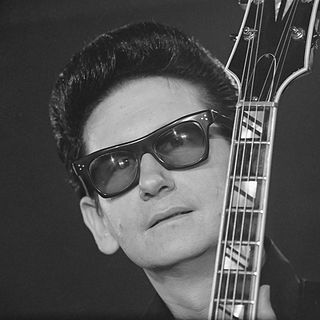
Roy Kelton Orbison was an American singer, songwriter, and musician known for his impassioned singing style, complex song structures, and dark, emotional ballads. Orbison's music is mostly in the rock genre and his most successful periods were in the early 1960s and the late 1980s. His music was described by critics as operatic, earning him the nicknames "The Caruso of Rock" and "The Big O". Many of Orbison's songs conveyed vulnerability at a time when most male rock-and-roll performers projected machismo. He performed with minimal motion and in black clothes, matching his dyed black hair and dark sunglasses.
Joe Melson is an American singer and a BMI Award-winning songwriter best known for his collaborations with Roy Orbison, including "Only the Lonely" and "Crying", which are both in the Grammy Hall of Fame and have both been included in Rolling Stone's 500 Greatest Songs of All Time. Melson was inducted into the Nashville Songwriters Hall of Fame in 2018.
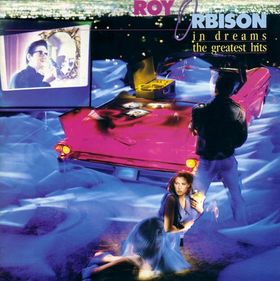
In Dreams: The Greatest Hits is a two-record album set by Roy Orbison songs released in 1987 on Virgin Records. It was produced by Orbison and Mike Utley, except for the song "In Dreams", produced by Orbison with T-Bone Burnett and film director David Lynch. All songs are re-recordings by Orbison from 1986, except "In Dreams" from April 1987.
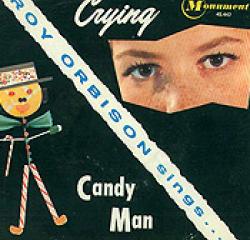
"Crying" is a song written by Roy Orbison and Joe Melson for Orbison's third studio album of the same name (1962). Released in 1961, it was a number 2 hit in the US for Orbison and was covered in 1978 by Don McLean, whose version went to number 1 in the UK in 1980.

"Only the Lonely (Know the Way I Feel)" is a 1960 song written by Roy Orbison and Joe Melson. Orbison's recording of the song, produced by Fred Foster for Monument Records, was the first major hit for the singer. It was described by The New York Times as expressing "a clenched, driven urgency". Released as a 45 rpm single by Monument Records in May 1960, "Only the Lonely" went to No. 2 on the United States Billboard pop music charts on 25 July 1960 (blocked by Brenda Lee's "I'm Sorry") and No. 14 on the Billboard R&B charts. "Only the Lonely" reached number one in the United Kingdom, a position it achieved on 20 October 1960, staying there for two weeks (out of a total of 24 weeks spent on the UK singles chart from 28 July 1960). According to The Authorized Roy Orbison, "Only the Lonely" was the longest charting single of Orbison's career. Personnel on the original recording included Orbison's drummer Larry Parks, plus Nashville regulars Floyd Cramer on piano, Bob Moore on bass, and Hank Garland and Harold Bradley on guitars, Joe Melson and the Anita Kerr Singers on backing vocals. Drummer Buddy Harman played on the rest of the songs on the session.

"Running Scared" is a song written by Roy Orbison and Joe Melson and sung by Orbison. An operatic rock ballad, the recording of the song was overseen by audio engineer Bill Porter and released as a 45 rpm single by Monument Records in March 1961 and went to number one on the Billboard Hot 100 chart. "Running Scared" also reached No.9 in the UK Singles Chart. It sold over one million copies in the US alone. The song was included on Orbison's 1962 album Crying as the final track on the album.

"In Dreams" is a song composed and sung by singer Roy Orbison. An operatic rock ballad of lost love, it was released as a single on Monument Records in February 1963. It became the title track of the album In Dreams, released in July of the same year. The song has a unique through-composed structure in seven movements in which Orbison sings through two octaves, beyond the range of most rock singers.
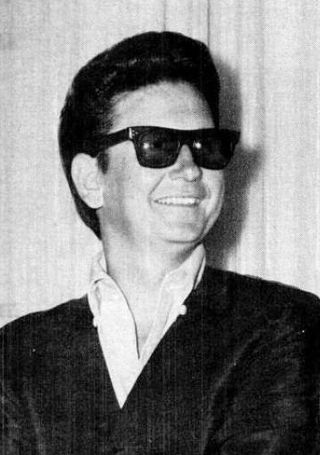
Roy Orbison was an American singer-songwriter who found the most success in the early rock and roll era from 1956 to 1964. He later enjoyed a resurgence in the late 1980s with chart success as a member of the Traveling Wilburys and with his Mystery Girl album, which included the posthumous hit single "You Got It". At the height of his popularity, 22 of Orbison's songs placed on the US Billboard Top 40 chart, and six peaked in the top five, including two number-one hits. In the UK, Orbison scored ten top-10 hits between 1960 and 1966, including three number-one singles.

"Ooo Baby Baby" is a song written by Smokey Robinson and Pete Moore. It was a 1965 hit single by The Miracles for the Tamla (Motown) label.

"You Got It" is a song from American singer Roy Orbison's 22nd studio album, Mystery Girl (1989). The song was released posthumously on January 3, 1989, after Orbison's death from a heart attack on December 6, 1988. The song was issued with "The Only One" as the B-side and was later released with "Crying". The single reached number nine on the US Billboard Hot 100 and number one on the Adult Contemporary chart, returning Orbison to the top 10 for the first time in 25 years. "You Got It" also reached number three on the UK Singles Chart and entered the top five in 10 other countries. Although it is an Orbison solo single, Orbison's fellow Traveling Wilburys bandmates Tom Petty and Jeff Lynne co-wrote the song and played instruments on the record.

"Different Drum" is a song written by American singer-songwriter Michael Nesmith in 1964. It was first recorded by the northern bluegrass band The Greenbriar Boys and included on their 1966 album Better Late than Never! Nesmith offered it to the Monkees, but the producers of the TV show, who had wide control over the group's musical output early on, turned him down.

"Heat Wave" is a 1963 song written by the Holland–Dozier–Holland songwriting team. It was first made popular by the Motown vocal group Martha and the Vandellas. Released as a 45 rpm single on July 9, 1963, on the Motown subsidiary Gordy label, it hit number one on the Billboard Hot R&B chart—where it stayed for four weeks—and peaking at number 4 on the Billboard Hot 100.
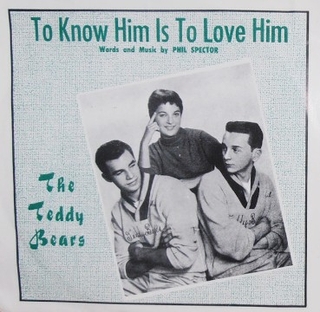
"To Know Him Is to Love Him" is a song written by Phil Spector, inspired by words on his father's tombstone, "To Know Him Was to Love Him." It was first recorded by the only vocal group of which he was a member, the Teddy Bears. Their recording spent three weeks at No. 1 on the Billboard Hot 100 chart in 1958, while reaching No. 2 on the UK's New Musical Express chart. Peter & Gordon and Bobby Vinton later had hits with the song, with its title and lyrics changed to "To Know You Is to Love You". In 1987, the song was resurrected by Dolly Parton, Linda Ronstadt, and Emmylou Harris, whose Trio recording topped the U.S. country singles chart.
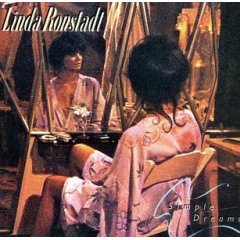
Simple Dreams is the eighth studio album by the American singer Linda Ronstadt, released in 1977 by Asylum Records. It includes several of her best-known songs, including her cover of the Rolling Stones song "Tumbling Dice" and her version of the Roy Orbison song "Blue Bayou", which earned her a Grammy nomination for Record of the Year. The album also contains covers of the Buddy Holly song "It's So Easy!" and the Warren Zevon songs "Poor Poor Pitiful Me" and "Carmelita". The album was the best-selling studio album of her career, and at the time was the second best-selling album by a female artist. It was her first album since Don't Cry Now without long-time musical collaborator Andrew Gold, though it features several of the other Laurel Canyon-based session musicians who appeared on her prior albums, including guitarists Dan Dugmore and Waddy Wachtel, bassist Kenny Edwards, and producer and multi-instrumentalist Peter Asher.

"Just One Look" is a song co-written by American R&B singers Doris Troy and Gregory Carroll. The recording by Doris Troy was a hit in 1963. The Hollies, Anne Murray, Linda Ronstadt and Iain Matthews each achieved great success with the song. There have also been many other versions.

"Oh, Pretty Woman" or simply "Pretty Woman" is a song recorded by Roy Orbison, written by Orbison and Bill Dees. It was released as a single in August 1964 on Monument Records and spent three weeks at number one on the Billboard Hot 100 from September 26, 1964, the second and final single by Orbison to top the US charts. It was also Orbison's third single to top the UK Singles Chart.
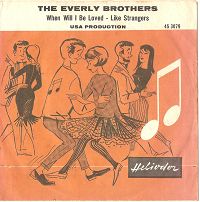
"When Will I Be Loved" is a popular song written by Phil Everly of the Everly Brothers, who had a US top-ten hit with it in 1960. Linda Ronstadt covered the song in 1975, and her version was an even bigger hit in the US, peaking at No. 2. Vince Gill also covered it in 1994 on the soundtrack of the film 8 Seconds.

"It's So Easy!" is a rock-and-roll song written by Buddy Holly and Norman Petty. It was originally released as a single in 1958 by the Crickets but failed to chart. It was the final release by the Crickets when Holly was still in the band.
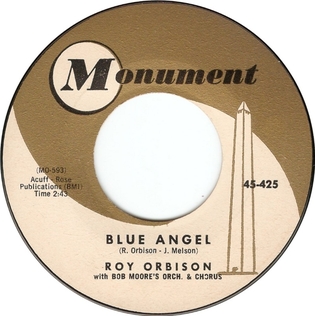
"Blue Angel" is a song by Roy Orbison, released as a single in August 1960. Released as the follow-up to the international hit "Only the Lonely ", "Blue Angel" peaked at number nine on the Billboard Hot 100 and number eleven on the UK's Record Retailer Top 50.

"Candy Man" is a song by Roy Orbison, released as the B-side to his international hit "Crying" in July 1961. It was later covered by British beat group Brian Poole and the Tremeloes, becoming a top-ten hit in the UK.




















